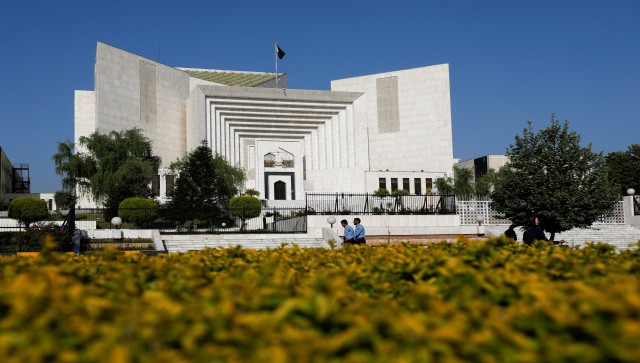The clash between Pakistan’s institutions has only been intensifying, despite the interregnum of otherwise becalming Eid-ul-Fitr holidays. On 26 April, a gauntlet was thrown to the Supreme Court (SC) by holding a meeting of the Pakistan Democratic Alliance (PDM) government allies and re-convening a National Assembly session in Islamabad. Even as half-hearted attempts to start a dialogue with Pakistan Tehreek-e-Insaf (PTI) politicians to arrive at an acceptable date for national and provincial elections in pursuance of the CJ’s directive expectedly came to nought, Prime Minister Shahbaz Sharif told his allies that the Supreme Court’s role was not that of an “arbitrator” or “to act like a panchayat”, but to decide cases in accordance with the law/ Constitution. Fiery speeches were witnessed in the National Assembly (NA), threatening even ‘contempt in reverse’ against the judges, or references to its Privileges Committee (in apparent violation of Art 68, which precludes scrutiny of judges’ actions). After taking a “sense of the House”, the Speaker, Raja Pervez Ashraf wrote a letter to the Chief Justice urging the higher judiciary to “exercise restraint” and respect the parliament’s legislative domain. He stressed, the SC ‘must, as far as possible, avoid getting involved in [the] political thicket, leaving resolution of political matters’ to the parliament and political parties. The letter flagged the attempt “to approve expenditure from federal consolidated fund” as ‘encroachment upon the National Assembly’s powers’ and pressure tactics. It urged the SC to work together to uphold the Constitution and protect democratic values remaining within respective institutional domains, to ensure that confrontation between the organs of the state is avoided and constitutional order is maintained. Appearing on Dawn News TV’s Spotlight programme (21 April), Pakistan’s former Prime Minister, Shahid Khaqan Abbasi (August 2017-May 2018), himself of defence officials’ lineage (also from his spouse’s side!), made an interesting comment, warning that the current economic and military crisis had all the makings of attracting a military takeover. The Army had intervened in the past in much less severe circumstances, he assessed, observing that martial law always remained a possibility when the system failed or there was a conflict between institutions and political leaders failed to chart a course forward. These remarks trended on Twitter and set other social media blogs a flutter, anticipating such imminent ‘worst case’ scenarios. To confound matters, a new audio leak surfaced on 23 April, of a talk allegedly between CJ Bandial’s mother in law, Mahjabeen Noon and wife of PTI lawyer (and former Punjab Governor) Khwaja Tariq Rahim, Rafia Tariq. In the audio, Bandial’s mother in law admits having attended a recent rally of Imran Khan in Lahore. Rafia acknowledges being in WhatsApp contact with the CJ. While hoping for ‘more strength’ to the CJ to enable him to stand up firmly against the federal government, they imply in the conversation that even an early imposition of martial law could be a better option than the prevailing stasis and confrontation! Though this intrusion of privacy has been condemned as ‘illegal’ by Pakistan’s civil society, its timing is curious, emerging just when CJ Bandial’s three-judge SC bench was set to resume its hearing on the petition against the delay in the Punjab Assembly elections. One perceptive observer of SC proceedings claimed, it exposed the grip of the so-called ‘Lahore group’ on recent judicial decisions unduly favouring Imran Khan and certainly increased pressure on Umar Ata Bandial, who took sick leave from the SC for a day (26 April). Meanwhile, even as Army Chief Gen Asim Munir left on a four-day visit to China (24 April), new Director General, Inter-Services Public Relations (ISPR), Maj Gen Ahmed Sharif Chaudhry held his first press conference (Islamabad, 25 April). Referring to the Army as a “national” institution, he said, it had respect for all politicians and political parties. The “centre of real power” was the nation. However, he emphasized, the army had a “constitutional and non-political” relationship with the government of the time. ‘It was inappropriate to paint that relationship with a political colour’. Chaudhry added that talks on social media against the army, institutions and their officeholders were ‘irresponsible and unwise’, especially if such criticism emanated from ‘retired military personnel’, who ‘should not wear a political garb’. The DG (ISPR)’s remarks indicated clearly that while the military establishment was not contemplating any unwarranted ‘front-door entry’ at present, it was standing behind the PDM government. When questioned regarding the provision of military personnel for the Punjab polls, Chaudhry replied, “The position was what the Ministry of Defence had already told the Supreme Court earlier, based on facts on the ground.” Displaying a calmer demeanor at the resumed hearings of the three-judge bench on 27 April, CJ Bandial heard attorneys representing the government and opposition and adjourned proceedings, urging them to please come together ‘for the sake of (upholding) the law’ and hold talks to resolve the impasse. In an effort to extricate himself from a blind alley, he clarified that he would issue ‘an appropriate order’ in this regard, ‘without stipulating any timeline or mandatory guidance’. If such talks do take off on forging a compromise date for one-day elections at the federal and provincial level, the Supreme Court could provide a one-time amending proviso to the 90-day stipulation for holding elections. Though chances of success seem minimal, this may arrest the cascading slide towards constitutional disaster to which Pakistan seems headed. The writer is a former special secretary, Cabinet Secretariat. Views expressed are personal. Read all the Latest News , Trending News , Cricket News , Bollywood News , India News and Entertainment News here. Follow us on Facebook, Twitter and Instagram.
Prime Minister Shahbaz Sharif told his allies that the Supreme Court’s role was not that of an ‘arbitrator’ or ‘to act like a panchayat’, but to decide cases in accordance with the law/ Constitution
Advertisement
End of Article


)

)
)
)
)
)
)
)
)



